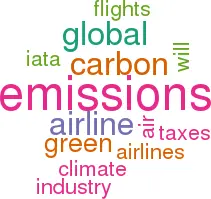Green morality and airlines
November 2006


There is still a wide disconnect between the environmentalist lobby and the airline industry. The pressure for green taxes on air travel is intensifying while airlines largely continue to largely ignore the issues.
One of the reasons for the airlines' complacency is that emissions from international flights were excluded from the Kyoto Protocol, which the US in any case hasn’t signed up to. Another reason is that airline carbon trading in the EU, which is the UK government’s favoured option, has been officially delayed to 2010, two years later than planned, and is likely to slip back further.
Meanwhile, influential research bodies like the Global Carbon Project are reporting that recent efforts to reduce carbon emissions have had no discernible effect and are demanding immediate caps on emissions.
Within the UK Government, the Environment Minister, David Miliband is waging a widely leaked campaign to impose green taxes on aviation; his suggestions include doubling air passenger duty on intra–EU and long–haul haul flights (currently £5–10 and £20–40 per departing passenger, depending on cabin class); adding VAT to domestic UK flights presumably at 17.5%; and adding VAT at the same rate to jet kerosene sales.
The airline industry’s response is that it currently contributes only 2–3% to global carbon emissions. However, taking the longer view and assuming that other industries cut their emissions in line with the Kyoto Protocol, air transport is predicted to become one of the biggest contributors to global warming. The UN Intergovernmental Panel on Climate Change (IPCC) estimates that aviation will account for about 15% of global warming effects ("anthropogenic forcing of climate change" in the jargon) by 2050. IATA, quoting the same body, claims that carbon emissions from aircraft will still only contribute 3% by 2050. For the Green lobby this seems to be evidence of the airline industry simply ignoring the climate crisis. IATA also talks extensively about reducing emissions by rationalising ATC systems, which is logical but hardly likely to capture the hearts and minds of the environmentalists.
Ironically, it isn’t the IATA carriers that are the main targets of the environmentalists, but European low cost carriers which are being blamed for "unnecessary" short–haul flying. A recent CAA study, which has revealed that the typical British user of LCC services comes from a high socio–economic group with an income typically 50% above the national average, has added moralistic force to their argument.
It is hoped that the 2007 ICAO General Assembly will come up with a global policy on emissions, but this seems, well, hopeful. To borrow the language of the Greens, the airline industry, all sectors, needs to engage effectively in the environmental debate; otherwise the risk is demand suppression through taxes or legislation.